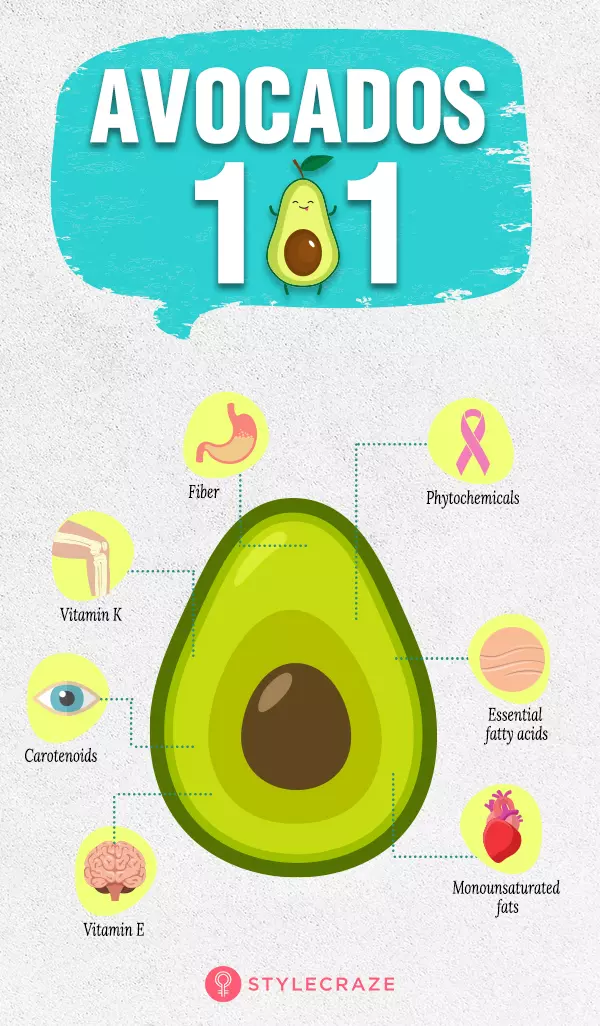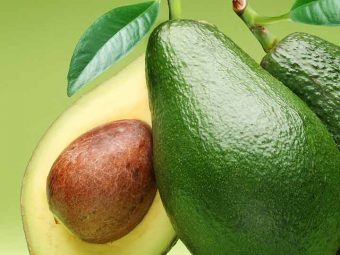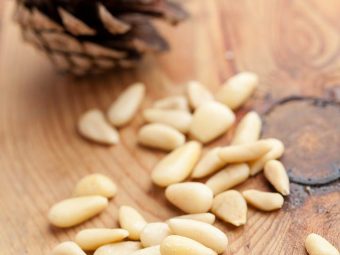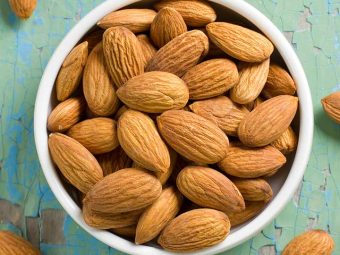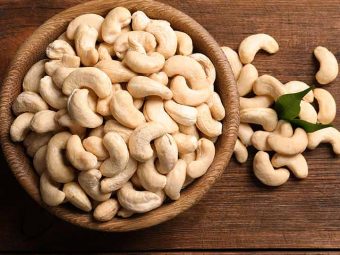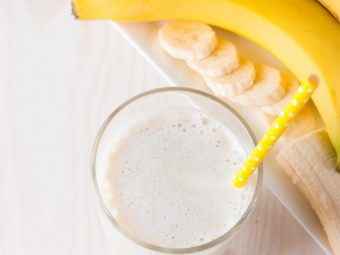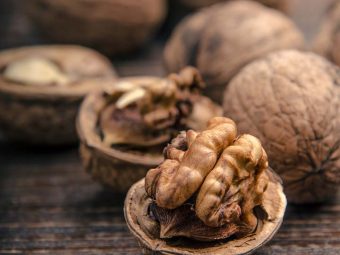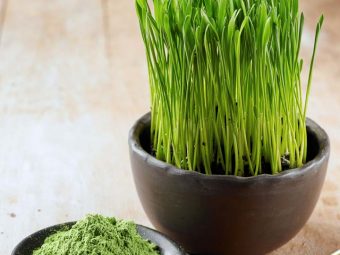11 Health Benefits Of Avocados, Nutrition, And Side Effects
From improving heart health to aiding weight loss, these pear-shaped fruits are superfoods.
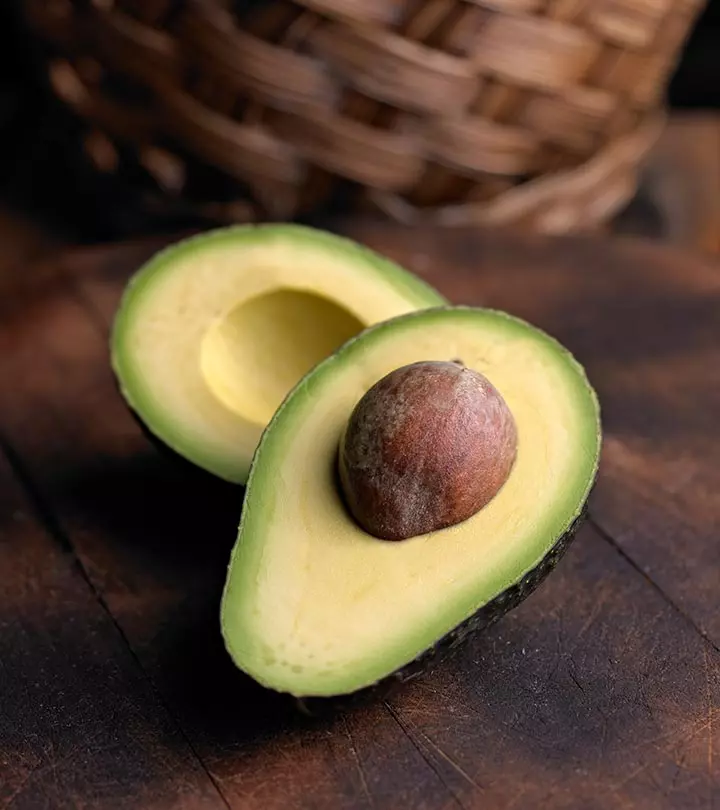
Avocado benefits your health in numerous ways. Its healthy fat content makes it an ideal choice for various smoothies. Many people love spreading it on toast as well. There are many ways in which avocados can improve your health. Learn all about how avocados benefit your health, their nutritional profile, and how to add them to your diet below. Scroll down to know more!
In This Article
What Are Avocados?
Avocado is scientifically called Persea americana. It originated in Southern Mexico and Columbia about 7,000 years ago. As time passed, the English colonists nicknamed avocados as alligator pears (for their characteristic green scaly skin and pear shape).
Today, this fruit is available in over 80 varieties (from pear-shaped to round and from green to black). Among them, Hass avocado is the most popular.
According to the American Journal of Clinical Nutrition, avocados are one of the few foods without any assigned GI (glycemic index) values. This is because they contain very little carbohydrates, and it is highly unlikely anyone would be able to eat so many avocados to consume even 25 grams of carbohydrates (1).
If you think this fact makes the fruit beneficial, well, we have a lot more in store for you.
How Can Avocados Benefit You?
1. Promote Heart Health
Research shows that avocado consumption was associated with an increase in serum levels of HDL cholesterol (good cholesterol), which can have a positive impact on heart health. More long-term trials are needed to validate this, though (2).
Another report suggests that making avocados a part of your regular diet can lower LDL levels and cut the risk of cardiovascular disease (3). The monounsaturated fats in the fruit can be responsible for this.
Eating avocados is a healthy way of treating hyperlipidemia, without having any negative effects on HDL cholesterol (which is often the case with low-saturated fat diets) (4).
Studies show that ripe avocados are better. As the fruits ripen, their saturated fat content decreases while the levels of oleic acid (the monounsaturated fatty acid) increase (5). The fruits also contain potassium, which helps regulate blood pressure levels. This further results in improved heart health.
2. Aid Cancer Treatment
Avocados contain avocatin B, a specific lipid, which was found to fight leukemia stem cells that may cause a rare and deadly form of cancer (6).
In another study, an avocado extract had inhibited the growth of prostate cancer cells. This has been attributed to the monounsaturated fats in the fruit, which, along with other phytochemicals, can contribute to reduced cancer risk (7).
Phytochemicals in avocados were also found to inhibit cancer cell growth and induce apoptosis (cell death) in precancerous and cancer cell lines (8).
Another report states that these phytochemicals can be considered as appropriate complementary treatments for esophageal and colon cancers (9).
3. Help With Weight Loss
Studies show that body weight, waist circumference, and BMI are significantly lower in individuals who consume avocados regularly (10). This can mean a reduced risk of metabolic syndrome as well, thanks to the presence of monounsaturated fatty acids and, more importantly, dietary fiber.
Avocado extracts also exhibited hypolipidemic activity, which, as per studies, can reduce the risk of obesity (11). Avocados are also replete with monounsaturated fatty acids, which were found to have positive effects on weight maintenance, appetite sensations, and energy metabolism (12).
4. Avocados Boost Vision
Lutein and zeaxanthin and other carotenoids are essential for boosting vision health. These compounds are found to prevent age-related macular degeneration, cataracts, and other forms of eye diseases (13).
Interestingly, studies show that the addition of avocado to one’s diet can enhance the absorption of these carotenoids. This ultimately helps boost eye health (14).
Avocado intake was also associated with an increased macular pigment density in older adults (15). Macular pigment has a role in visual function as it acts as a blue light filter. The fruit is also rich in vitamin E, which is another essential antioxidant for eye health (16).
Avocados also contain lutein and zeaxanthin, which are two powerful carotenoids that contribute to eye health (5).
5. May Enhance Cognitive Function
The monounsaturated fats in avocados can promote cognitive function (17). The cognition-enhancing effects of the fruit can also be attributed to vitamin E. This antioxidant nutrient was found to reduce cognitive decay in the elderly (18).
Studies also suggest that vitamin E can offer the greatest antioxidant protection against Alzheimer’s disease. Avocados, being a good source of this nutrient, can play an important role here (19).
6. Improve Bone Health
Raw avocados contain boron, a mineral that may enhance calcium absorption and benefit bones (20).
Avocados are also rich in vitamin K, which has an important role in bone health. The nutrient boosts bone formation and also offers osteoprotective benefits (21).
Avocados can have a role to play in treating arthritis as well. Research shows that the monounsaturated fats in this fruit have anti-inflammatory potential. The vitamin E in the fruit also has anti-inflammatory properties (22). These characteristics of avocados can make them one of the foods that help manage arthritis.
7. Promote Digestive Health
The fiber in avocados gets the credit here. They also contain potassium, which is known to promote healthy digestion. As avocados are low in fructose, they are also less likely to cause stomach gas (23).
Avocados are also a preferred food to combat diarrhea. The potassium they contain helps replenish the lost electrolytes. You may sprinkle some salt over avocados for an additional dash of sodium in the event of diarrhea (24).
8. May Aid Diabetes Treatment
Though avocados have comparatively more calories, they are also replete with fiber and essential fats and low on carbs. Therefore, this may make them one of the ideal foods for those with diabetes.
According to the American Diabetes Association, the type of fat you consume is more important than its amount. The association recommends eating more of monounsaturated fat, citing avocado as one of the best foods in this regard (25). It also strongly recommends people with diabetes to include avocados in their diet (26).
The fiber in avocados plays a role too. Multiple studies show that fiber can lower fasting blood sugar levels in diabetes patients (27).
Despite the research, we recommend you check with your doctor before adding avocados to your diabetes diet. They are high in calories as well, and that characteristic may have different impacts on different diabetes patients.
9. May Help Fight Wrinkles
The essential fatty acids (EFAs) in avocados may delay signs of skin aging. EFAs are important for the synthesis of tissue lipids (28). They may also inhibit wrinkle formation.
Rat studies show that intake of avocado oil may boost total collagen content in the skin. This was attributed to specific active factors that were present in the avocado seed (29).
Avocado oil has also been used for wound healing in addition to treating wrinkles (30).
10. Might Be Useful To Treat Psoriasis
Avocado oil has also been used in treating psoriasis. In one study, a vitamin B12 cream containing avocado oil was found to be quite effective in treating psoriasis (31).
The monounsaturated fats in the fruit can fight inflammation and may hence also aid in psoriasis treatment.
11. May Promote Hair Health
The vitamin E in avocados may strengthen hair and promote hair growth. Vitamin E also helps repair damage on the scalp, which can lead to decelerated hair growth.
A study showed that a group that received vitamin E supplementation experienced increased hair growth (32). We aren’t yet sure how this translates to using a real avocado. But there is no harm in giving a try.
One thing you can try is this avocado mask. Combine a chopped avocado and egg yolk in a bowl. Add enough water to make a paste. Apply this mixture to damp hair and massage into the scalp. Leave for about 20 minutes and then rinse with warm water.
[ Read: Benefits Of Avocado Oil For Hair ]
Avocados have powerful benefits because of their incredible nutritional profile. Though the monounsaturated fats, fiber, and vitamins K and E are the fruit’s biggest nutrients, there are others that also contribute.
What Is The Nutrition Profile Of Avocados?
| Calorie Information | ||
|---|---|---|
| Amounts Per Selected Serving | %DV | |
| Calories | 240(1005 kJ) | 12% |
| From Carbohydrate | 45.9(192 kJ) | |
| From Fat | 184(770 kJ) | |
| From Protein | 10.1(42.3 kJ) | |
| From Alcohol | 0.0(0.0 kJ) | |
| Carbohydrates | ||
| Amounts Per Selected Serving | %DV | |
| Total Carbohydrate | 12.8g | 4% |
| Dietary Fiber | 10.1g | 40% |
| Starch | 0.2g | |
| Sugars | 1.0g | |
| Sucrose | 90.0mg | |
| Glucose | 555mg | |
| Fructose | 180mg | |
| Lactose | 0.0mg | |
| Maltose | 0.0mg | |
| Galactose | 150mg | |
| Fats & Fatty Acids | ||
| Amounts Per Selected Serving | %DV | |
| Total Fat | 22.0g | 34% |
| Saturated Fat | 3.2g | 16% |
| 4:00 | 0.0mg | |
| 6:00 | 0.0mg | |
| 8:00 | 1.5g | |
| 10:00 | 0.0mg | |
| 12:00 | 0.0mg | |
| 13:00 | ~ | |
| 14:00 | 0.0mg | |
| 15:00 | 0.0mg | |
| 16:00 | 3112mg | |
| 17:00 | 0.0mg | |
| 18:00 | 73.5mg | |
| 19:00 | ~ | |
| 20:00 | 0.0mg | |
| 22:00 | 0.0mg | |
| 24:00:00 | 0.0mg | |
| Monounsaturated Fat | 14.7g | |
| 14:01 | 0.0mg | |
| 15:01 | 0.0mg | |
| 16:1 undifferentiated | 1047mg | |
| 16:1 c | ~ | |
| 16:1 t | ~ | |
| 17:01 | 15.0mg | |
| 18:1 undifferentiated | 13597mg | |
| 18:1 c | ~ | |
18:1 t | ~ | |
| 20:01 | 37.5mg | |
| 22:1 undifferentiated | 0.0mg | |
| 22:1 c | ~ | |
| 22:1 t | ~ | |
24:1 c | ~ | |
| Polyunsaturated Fat | 2.7g | |
| 16:2 undifferentiated | ~ | |
| 18:2 undifferentiated | 2511mg | |
18:2 n-6 c,c | ~ | |
| 18:2 c,t | ~ | |
| 18:2 t,c | ~ | |
| 18:2 t,t | ~ | |
| 18:2 i | ~ | |
| 18:2 t not further defined | ~ | |
| 18:03 | 187mg | |
| 18:3 n-3, c,c,c | 167mg | |
| 18:3 n-6, c,c,c | 22.5mg | |
| 18:4 undifferentiated | 0.0mg | |
| 20:2 n-6 c,c | 0.0mg | |
| 20:3 undifferentiated | 24.0mg | |
| 20:3 n-3 | ~ | |
| 20:3 n-6 | ~ | |
| 20:4 undifferentiated | 0.0mg | |
| 20:4 n-3 | ~ | |
| 20:4 n-6 | ~ | |
| 20:5 n-3 | 0.0mg | |
| 22:02 | ~ | |
| 22:5 n-3 | 0.0mg | |
| 22:6 n-3 | 0.0mg | |
| Total trans fatty acids | ~ | |
| Total trans-monoenoic fatty acids | ~ | |
| Total trans-polyenoic fatty acids | ~ | |
| Total Omega-3 fatty acids | 165mg | |
| Total Omega-6 fatty acids | 2534mg | |
| Protein & Amino Acids | ||
| Amounts Per Selected Serving | %DV | |
| Protein | 3.0g | 6% |
| Vitamins | ||
| Amounts Per Selected Serving | %DV | |
| Vitamin A | 219IU | 4% |
| Vitamin C | 15.0mg | 25% |
| Vitamin D | ~ | ~ |
| Vitamin E (Alpha Tocopherol) | 3.1mg | 16% |
| Vitamin K | 31.5mcg | 39% |
| Thiamin | 0.1mg | 7% |
| Riboflavin | 0.2mg | 11% |
| Niacin | 2.6mg | 13% |
| Vitamin B6 | 0.4mg | 19% |
| Folate | 122mcg | 30% |
| Vitamin B12 | 0.0mcg | 0% |
| Pantothenic Acid | 2.1mg | 21% |
| Choline | 21.3mg | |
| Betaine | 1.1mg | |
| Minerals | ||
| Amounts Per Selected Serving | %DV | |
| Calcium | 18.0mg | 2% |
| Iron | 0.8mg | 5% |
| Magnesium | 43.5mg | 11% |
| Phosphorus | 78.0mg | 8% |
| Potassium | 727mg | 21% |
| Sodium | 10.5mg | 0% |
| Zinc | 1.0mg | 6% |
| Copper | 0.3mg | 14% |
| Manganese | 0.2mg | 11% |
| Selenium | 0.6mcg | 1% |
| Fluoride | 10.5mcg | |
One half of an avocado (68 g) contains about 113 calories. It also contains 14 mg of vitamin K (19% of daily value), 60 mg of folate (15% of DV), 12 mg of vitamin C (12% of DV), 342 mg of potassium (10% of DV), and 0.4 mg of vitamin B6 (9% of DV).
That is an ultra-impressive nutritional profile, isn’t it? Hence, it is all the more important you start including avocados in your daily diet. But how?
How To Include Avocados In Your Diet
Avocados are versatile. Although we are used to seeing the fruits spread on toast or tossed into salads or smoothies, these alligator pears go with almost anything. You can include them in soups or desserts or even have them as it is (with a pinch of salt and pepper, of course!)
You can also consume avocados in any of the following ways:
- Add avocado to your morning scrambled eggs.
- Replace mayonnaise with avocado to make chicken, tuna, or egg salads.
- Grill avocados and make them a wonderful side dish for barbecued meats.
- Use pickled avocados in your salads or sandwiches.
- Deep fry avocados and enjoy these avocado fries with different dipping sauces like mustard or ketchup.
- Prepare avocado ice cream by combining avocado, milk, lime juice, cream, and sugar.
- Add avocados to your breakfast pancakes.
The options are mind-boggling, aren’t they? But hold on. Here’s something you should know before you go all-in with avocados.
Do Avocados Have Side Effects?
Not many. But you must be aware of them nonetheless.
- May Cause Weight Gain
Avocados are high in fat. Eating too many of them can lead weight gain, so make sure to control your intake.
- Latex Allergy
Individuals who are sensitive to latex may have an allergic reaction to avocados. Hence, such people should avoid avocados.
Healthy and tasty, avocados are a popular component of salads, sandwiches, and other breakfast dishes. The benefits of avocado can be attributed to its rich fats, dietary fiber, vitamins, and carotenoids. These nutrients may help support a healthy heart and boost vision and brain function. Avocados may also help enhance bone and digestive health and manage diabetes. However, they may cause allergies in certain people. Do not consume avocados if you have latex allergies.
Frequently Asked Questions
Can you eat an avocado raw?
Yes. In fact, that is how it is most often eaten. You can also cook it if you want.
How about eating avocados on an empty stomach?
We aren’t sure about this. The fruit is exceptionally rich in fiber – so eating it first thing in the morning might tax your digestive system.
How many avocados can you eat in a day?
One-half to two avocados a day should be fine. But it also depends on how many calories you usually take. An average avocado contains about 322 calories and 29 grams of fat.
How to keep avocados from browning?
You can coat the avocado with olive oil to prevent oxidation. Store it in an airtight container in your refrigerator for future use.
Is the avocado seed poisonous?
There is not enough evidence,so avoid eating it.
How long does an avocado last?
It usually lasts for 1 to 3 days if stored at room temperature. Inside the refrigerator, it may last for 3 to 5 days.
References
- “International table of glycemic index and…” The American Journal of Clinical Nutrition.
- “Avocado consumption and risk factors…” The American Journal of Clinical Nutrition, US National Library of Medicine.
- “An avocado a day keeps the cardiologist away” PennState University.
- “Effects of avocado as a source of monounsaturated...” Archives of Medical Research, US National Library of Medicine.
- “Hass avocado composition and potential…” Critical Reviews in Food Science and Nutrition, US National Library of Medicine.
- “Targeting mitochondria with avocatin B…” Cancer Research.
- “Inhibition of prostate cancer cell growth...” The Journal of Nutritional Biochemistry, ScienceDirect.
- “Chemopreventive characteristics of avocado fruit” Seminars in Cancer Biology, ScienceDirect.
- “Evaluating the effect of four extracts of avocado fruit…” Acta Medica Iranica.
- “Avocado consumption is associated with better...” Nutrition Journal, US National Library of Medicine.
- “Effect of Persea americana fruit extract…” Journal of Complementary & Integrative Medicine, US National Library of Medicine.
- “Current evidence supporting the link between...” Lipids, US National Library of Medicine.
- “The effect of lutein on eye and…”. Nutrients, US National Library of Medicine.
- “Carotenoid absorption from salad and salsa…” The Journal of Nutrition, US National Library of Medicine.
- “Avocado consumption increases macular pigment...” Nutrients, US National Library of Medicine.
- “Look to fruits and vegetables for good…” New York State Department of Health.
- “Healthy eating tips to try this month”. Centers for Disease Control and Prevention.
- “Brain foods: the effects of nutrients on brain…” Nature Reviews. Neuroscience, US National Library of Medicine.
- “Diet and Alzheimer’s disease…” Medscape General Medicine, US National Library of Medicine.
- “Bone health and osteoporosis…” National Center for Biotechnology Information.
- “Vitamin K and bone metabolism” BioMed Research International, US National Library of Medicine.
- “Best fruits for arthritis” Arthritis Foundation.
- “5 foods to improve your digestion” Johns Hopkins Medicine.
- “Diarrhea” Columbia University Medical Center.
- “Fats” American Diabetes Association.
- “Celebrating good fats as a key part of…” American Diabetes Association.
- “Dietary fiber for the treatment of type 2 diabetes…” Journal of the American Board of Family Medicine.
- “Discovering the link between nutrition and…” Dermato Endocrinology, US National Library of Medicine.
- “The effect of various avocado oils on…” Connective Tissue Research, US National Library of Medicine.
- “Effect of semisolid formulation of Persea…” Evidence-based Complementary and Alternative Medicine, US National Library of Medicine.
- “Vitamin B12 cream containing avocado oil…” Dermatology, US National Library of Medicine.
- “Diet and hair loss: effects of nutrient deficiency…” Dermatology Practical & Conceptual, US National Library of Medicine.



